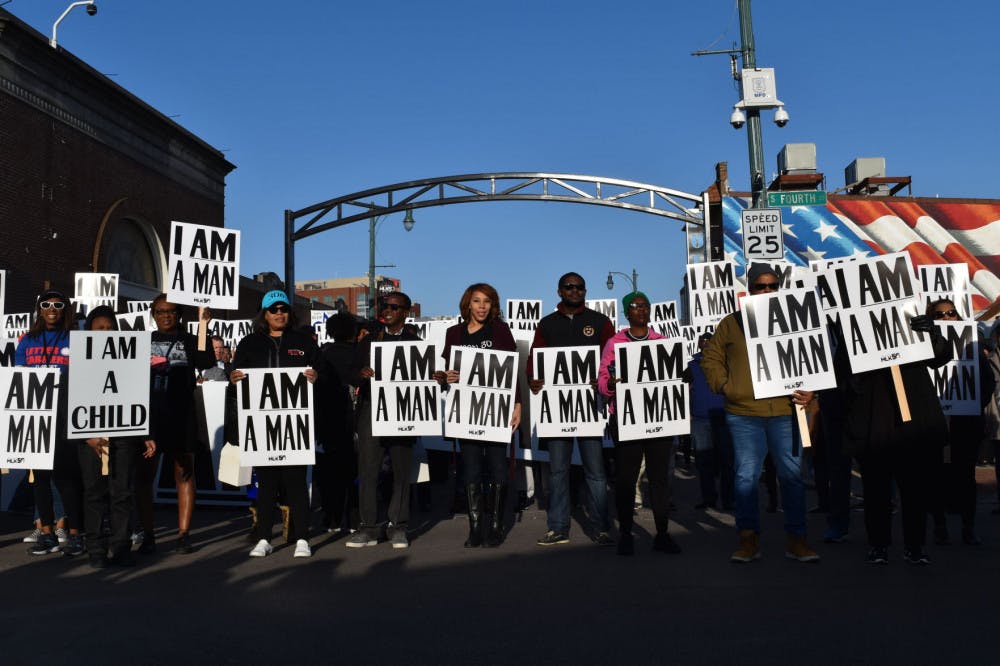As people stood in front of the National Civil Rights Museum in Downtown Memphis on Wednesday and listened to the words of Rev. Jesse Jackson, Sen. Bernie Sanders, Gina Belafonte and Bernice King (Martin Luther King, Jr.’s daughter) and the echo of the infamous Mountaintop speech, observers such as Ricky Smith questioned the outcome of the events on the city when the crowd fades and all the news outlets are gone.
“I honestly hope that a true sense of purpose comes out of today, and I hope people see how real activism was and how he (King) died for what he believed in,” Smith said. “There are so many social media activists, and I hope that people take in to account the amount of diligence it takes to bring about change.”
Hanging from the National Civil Rights Museum and the central theme of the event, “Where do we go from here?” allowed the audience to keep that question in the forefront of their thoughts. And when asked what the next steps for the city of Memphis would be, Kevin Brooks, a Memphis native who was documenting the historic event, said as a city and as a country, the only thing that can be done is to keep pushing forward.
“We celebrate Dr. King’s death because it sparked so much, but we are still in this type of arena where we are fighting on all sides,” Brooks said. “But his death reminds us and this day reminds us that we need to keep moving because there is so much left to be done.”
From the amount of protests and marches occurring after the Parkland, Florida, shooting to the recent incident of an unarmed black man being shot 20 times in Sacramento, citizens all across the country have been pouring into the streets pleading for just that — change. King dreamed of a post-racial society and helped lay the foundation, but with tensions high after the 2016 presidential election, the words, “Where do we go from here?” posed an interesting question.
Wynett Jones said she hopes the coverage of MLK50 creates an open space for communication between Memphians.
“I hope that the attention this commemoration receives helps to bring healing to the sanitation workers and the city of Memphis,” Jones said. “There should be a conversation after today to help plan the next steps.”
Chase Campbell, who has only lived in Memphis for a short period said he hopes this brings about unity and peace in the city and in the hearts of the people.
“Just standing out here today, you can feel the growth,” Campbell said. “I expect so much from the people of Memphis after today.”
Glenda C. Hicks was one of thousands of people who watched and participated in the 50th commemoration of King’s death. King left a mark on Memphis and gave his life and his voice to those who were not given the opportunities to speak.
“I came from Arkansas to Memphis when I was a teen back in the ‘60s because I thought that there was such excellent potential for African-Americans in this city,” Hicks said. “And I know that a lot of advantages that blacks have received in this city both then and now has certainly been because of Dr. King’s efforts, and today, we must honor that.”
Seeing people from all backgrounds come together to honor the legacy of King might allow some to argue the “promised land” has indeed been reached, and regardless of all things that seemingly divide the country, there are even more things that bridge it together. As citizens from across the country joined in and listened to the testimonies of all those who have paved the way, they also were reminded of the those who lost their lives for simple rights.
“It has only been 50 years, and I think all of us need to ask ourselves how have we progressed since he has came and gave his life for us,” Hicks said. “Martin did not die in vein, so we have to keep going. We have to.”
Participants line up to take a re-enactment photo of the famed 1968 Sanitation Strikers. The photo was taken from a drone April 4.
Participants line up to take a re-enactment photo of the famed 1968 Sanitation Strikers. The photo was taken from a drone April 4.
Current Memphis sanitation workers join the photo re-enactment. These workers were able to receive a union after their predecessors formed a strike in 1968, which brought Martin Luther King, Jr. to the city.
Current Memphis sanitation workers join the photo re-enactment. These workers were able to receive a union after their predecessors formed a strike in 1968, which brought Martin Luther King, Jr. to the city.
While the crowd honors King in silence, a wreath hangs outside the door where he was shot 50 years ago. Each year, the NCRM hangs a wreath where King was shot to honor his legacy.
A crowd gathers at the National Civil Rights Museum in commemoration of Martin Luther King, Jr.'s death. The event drew thousands of people to the Lorraine Motel.
Rev. Michael Pfleger speaks about King's mission and what needs to be done to achieve it. Pfleger said King was "uncompromising in his charge to subpoena the conscience of America."
Memphis Mayor Jim Strickland talks to the crowd with Tennessee Governor Bill Haslam and Shelby County Mayor Mark Luttrell. The crowd chanted "No Change" as he was speaking.
Friend of King and fellow protestor Rev. Jesse Jackson talks about his experiences with the activist and King's death. Jackson explained King's hardships of the FBI "tap(ping) his home phone" and "his allies turn(ing) on him."
Former United States president Barack Obama talks about King's legacy and drive. Although the Obama did not attend, he encouraged the crowd to continue the work King began.






